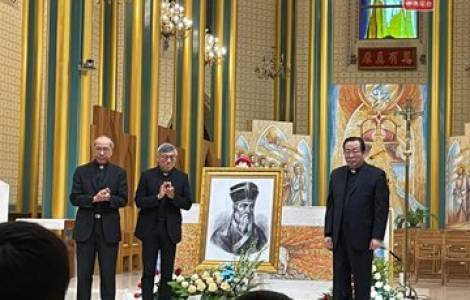
Rome (Agenzia Fides) - The great Jesuit missionary Matteo Ricci, who left Macerata and arrived in China in 1582 "to free - as he himself wrote - unhappy souls from eternal perdition", still represents "a great example of apostolic zeal". His missionary spirit and method "constitute a living and current model", and his fame as a man of science and culture "should not obscure the deepest motivation of all his efforts: the proclamation of the Gospel". This is how Pope Francis described the figure of the Jesuit of Macerata, whom he has re-proposed today among the figures of exemplary witnesses of apostolic zeal, with simple and essential accents. The Bishop of Rome dedicated to Matteo Ricci the new catechesis of the cycle dedicated to the passion for proclaiming the Gospel, delivered before the multitude gathered in St. Peter's Square to attend today's general audience today, Wednesday, May 31.
In his catechesis, the Pope briefly retraced the Christian adventure of Matteo Ricci, recalling that, as a young Jesuit, "enthused by the reports of missionaries whom he had listened to", like "so many other young people who felt the same, and he asked to be sent to the missions in the Far East. After the attempt by Francis Xavier, another twenty-five Jesuits had tried to enter China, without success. But Ricci and one of his confrères prepared themselves very well, carefully studying the Chinese language and customs, and in the end, they managed to settle in the south of the country". It took eighteen years, with four stages through four different cities - the Pope recalled - "to arrive in Peking, which was the centre. With perseverance and patience, inspired by unshakeable faith, Matteo Ricci was able to overcome difficulties and dangers, mistrust and opposition".
The path followed by Matteo Ricci - noted the Successor of Peter - was always "the way of dialogue and friendship with all the people he encountered, and this opened many doors to him for the proclamation of the Christian faith". To enter into Chinese culture and life, he first dressed like the Buddhist bonzes, then "he understood that the best way was to assume the lifestyle and robes of the literati". He studied "their classical texts in depth, so that he could present Christianity in positive dialogue with their Confucian wisdom and the customs of Chinese society. And this is called an attitude of inculturation. [In the early centuries of the Church] This missionary was able to “inculturate” the Christian faith, as the ancient fathers had done in dialogue with Greek culture".
The mathematical and astronomical knowledge of Ricci and his missionary followers - Pope Francis recalled - also contributed to a fruitful encounter between the culture and science of the West and the East. However, the Pontiff added – "Ricci’s fame as a man of science should not obscure the deepest motivation of all his efforts: namely, the proclamation of the Gospel. With scientific dialogue, with scientists, he went ahead but he bore witness to his faith, to the Gospel. The credibility obtained through scientific dialogue gave him the authority to propose the truth of Christian faith and morality". And the authority also came from his testimony of religious life, virtue and prayer: "these missionaries" underlined Pope Francis "prayed. They went to preach, they were active, they made political moves, all of that; but they prayed. It is what nourished the missionary life". Furthermore Matteo Ricci and his companions shared "a life of charity, they helped others, humbly, with total disinterest in honours and riches", and this too led "many of his Chinese disciples and friends to accept the Catholic faith. Because they saw a man who was so intelligent, so wise, so astute – in the good sense of the word – in getting things done, and so devout, that they said, ’But what he preaches is true, because it is part of a personality that witnesses, he bears witnesses to what he preaches with his own life’". (GV) (Agenzia Fides, 31/5/2023)